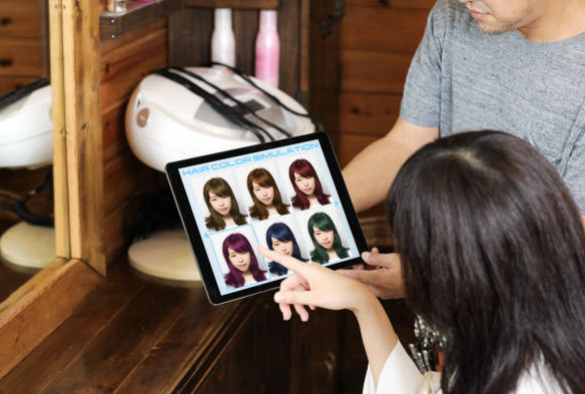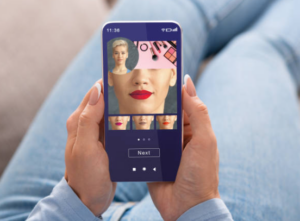In today’s digital age, the beauty landscape is constantly evolving, with new technologies and innovations reshaping our perception of beauty. One such phenomenon that has taken the beauty world by storm is the rise of beauty apps and filters. These digital tools have revolutionized how we enhance and transform our appearance, offering endless possibilities for self-expression and creativity.
However, they have also sparked important conversations about authenticity and the blurred lines between reality and fantasy. In this blog post, we’ll explore the impact of beauty apps and filters on our perception of beauty, as well as the implications for our self-image and confidence in the digital age.
The Evolution of Beauty Apps and Filters
The journey of beauty apps and filters has been nothing short of remarkable, transforming from simple editing tools to sophisticated platforms that revolutionize how we perceive and present ourselves digitally.
Early Beginnings: In the early days of smartphone photography, basic editing apps allowed users to make minor adjustments to their photos, such as cropping and adjusting brightness. These rudimentary tools laid the foundation for more advanced beauty apps to come.
Introduction of Filters: The introduction of filters marked a significant milestone in the evolution of beauty apps. Filters offered pre-set adjustments that could instantly enhance the look of a photo with just a tap. Initially, filters focused on basic effects like adjusting contrast and saturation, but they soon evolved to include more complex features such as skin smoothing and blemish removal.
Innovation in Facial Recognition Technology: One of the key advancements in beauty apps is the integration of facial recognition technology. This technology allows apps to detect and analyze facial features, enabling users to make precise adjustments to their appearance. From slimming faces to enlarging eyes, these features provide users with unprecedented control over their digital image.
Integration with Social Media Platforms: The integration of beauty apps with popular social media platforms has been a game-changer. Platforms like Instagram, Snapchat, and TikTok have incorporated built-in filters and editing tools, making it easier than ever for users to enhance their photos and videos before sharing them with the world. This seamless integration has contributed to the widespread adoption of beauty apps and filters among social media users.
Expansion of Features and Effects: As technology has advanced, so too have the features and effects offered by beauty apps and filters. Users can now experiment with a wide range of effects, from virtual makeup and hair color changes to facial reshaping and age modification. The possibilities are virtually endless, allowing users to express their creativity and imagination in new and exciting ways.
Customization and Personalization: Another trend in the evolution of beauty apps is the emphasis on customization and personalization. Many apps now offer users the ability to create their own filters and effects, allowing them to tailor their editing experience to their unique preferences and style. This level of customization empowers users to create truly original and distinctive content.
Cross-Platform Accessibility: Beauty apps and filters are no longer confined to smartphones and social media platforms. They have expanded to include desktop applications and web-based tools, making them accessible to users across a variety of devices and platforms. This cross-platform accessibility ensures that users can edit and enhance their photos wherever they are, whenever they want.


The Impact on Beauty Standards
Beauty apps and filters have had a profound effect on the way we perceive beauty, often setting unrealistic standards that can be damaging to self-esteem and body image.
Perpetuation of Unrealistic Ideals: One of the most significant concerns surrounding beauty apps and filters is their role in perpetuating unrealistic beauty ideals. The flawless, airbrushed images that dominate social media feeds can create an unattainable standard of beauty that leaves many feeling inadequate and insecure. This phenomenon, often referred to as “Snapchat dysmorphia,” has led to a rise in cosmetic procedures as individuals seek to achieve the digitally enhanced appearance they see online.
Homogenization of Beauty: Many beauty apps and filters prioritize certain features over others, leading to a homogenized and Westernized notion of beauty. Filters that lighten skin tones, slim facial features, and enlarge eyes perpetuate Eurocentric beauty standards that exclude diverse racial and ethnic features. This lack of representation can alienate individuals who do not fit into the narrow definition of beauty promoted by these digital tools, further exacerbating feelings of marginalization and insecurity.
Comparison Culture: The prevalence of digitally altered images on social media can foster a culture of comparison, where individuals constantly measure themselves against unrealistic standards. Seeing flawless images of others can lead to feelings of inadequacy and self-doubt, as individuals strive to live up to an unattainable ideal. This constant comparison can have a detrimental effect on mental health, contributing to anxiety, depression, and low self-esteem.
Pressure to Conform: The widespread use of beauty apps and filters can create pressure for individuals to conform to a certain standard of beauty in order to fit in or gain validation online. This pressure to present a flawless image can lead to feelings of insecurity and self-consciousness, as individuals feel the need to constantly edit and enhance their photos to meet societal expectations.
Impact on Self-Image and Confidence: For many individuals, the use of beauty apps and filters can have a negative impact on self-image and confidence. Constantly comparing oneself to digitally altered images can erode self-esteem and lead to feelings of inadequacy. Additionally, relying on filters to enhance one’s appearance can create a dependency on digital tools for validation, rather than embracing one’s natural beauty and unique features.


The Quest for Authenticity
Amidst concerns about the impact of beauty apps and filters on self-esteem and body image, there has been a growing movement towards authenticity and self-acceptance. This shift reflects a broader cultural desire to embrace diversity, challenge traditional beauty norms, and celebrate individuality.
Rise of Authentic Influencers: One of the most significant trends in recent years has been the rise of authentic influencers who eschew perfection in favor of realness. These influencers are known for sharing unfiltered, unedited images that showcase their natural beauty and imperfections. By embracing their flaws and vulnerabilities, they have cultivated loyal followings who appreciate their authenticity and relatability.
Body Positivity and Self-Love: The body positivity movement has gained momentum as individuals strive to love and accept themselves as they are. This movement promotes self-love, body acceptance, and confidence in one’s own skin, regardless of societal beauty standards. Influencers and activists champion body diversity and advocate for representation and inclusivity in the media and beauty industry.
Embracing Imperfections: Embracing imperfections has become a rallying cry for those seeking to challenge traditional beauty norms. Instead of hiding flaws or striving for perfection, individuals are encouraged to celebrate their uniqueness and embrace their imperfections as part of what makes them beautiful. This shift towards self-acceptance promotes a more inclusive and compassionate understanding of beauty.
Authentic Beauty Brands: Beauty brands have also responded to the demand for authenticity by embracing diversity and inclusivity in their marketing campaigns. Many brands feature models of all ages, sizes, and ethnicities in their advertisements, reflecting a more realistic and representative vision of beauty. Additionally, brands are increasingly transparent about their product formulations and marketing practices, earning the trust of consumers who value authenticity and integrity.
Digital Detox and Self-Reflection: In response to the pressures of social media and digital beauty culture, many individuals are taking steps to disconnect and engage in self-reflection. Digital detoxes, where individuals take a break from social media and digital devices, have become increasingly popular as people seek to reclaim their sense of self and prioritize their mental well-being. This intentional disengagement from digital beauty culture can foster a greater appreciation for natural beauty and authenticity.
Empowerment Through Self-Expression: Ultimately, the quest for authenticity is about empowerment through self-expression. By embracing our true selves and celebrating our individuality, we can cultivate confidence, resilience, and self-acceptance. Whether it’s through unfiltered selfies, makeup-free Mondays, or embracing our unique features, authenticity is a powerful tool for reclaiming control over our self-image and redefining beauty on our own terms.


Finding Balance in the Digital Age
While beauty apps and filters undoubtedly offer creative opportunities for self-expression, it’s essential to approach them with a critical eye and a healthy dose of skepticism. It’s okay to have fun experimenting with different looks and styles, but it’s essential to remember that these digital enhancements are just that—enhancements. They should not be used as a measure of self-worth or a standard of beauty to aspire to.
Finding balance in the digital age means cultivating self-confidence and self-acceptance both on and offline. It means recognizing that beauty comes in all shapes, sizes, and colors, and that our differences are what make us truly beautiful. It means using beauty apps and filters as tools for creativity and self-expression, rather than as a means of conforming to unrealistic beauty standards.
Ultimately, beauty apps and filters are just one small part of the beauty landscape. Real beauty is about so much more than what can be captured in a digital image—it’s about confidence, kindness, and authenticity. As we navigate the complexities of the digital age, let’s remember to embrace our uniqueness and celebrate the beauty of being real.
In conclusion, beauty apps and filters have undoubtedly reshaped our perception of beauty in the digital age, offering new ways to enhance and transform our appearance. However, they have also raised important questions about authenticity, representation, and self-esteem. By approaching these digital tools with mindfulness and self-awareness, we can harness their creative potential while staying true to ourselves and our individuality. After all, real beauty lies not in perfection, but in authenticity.



